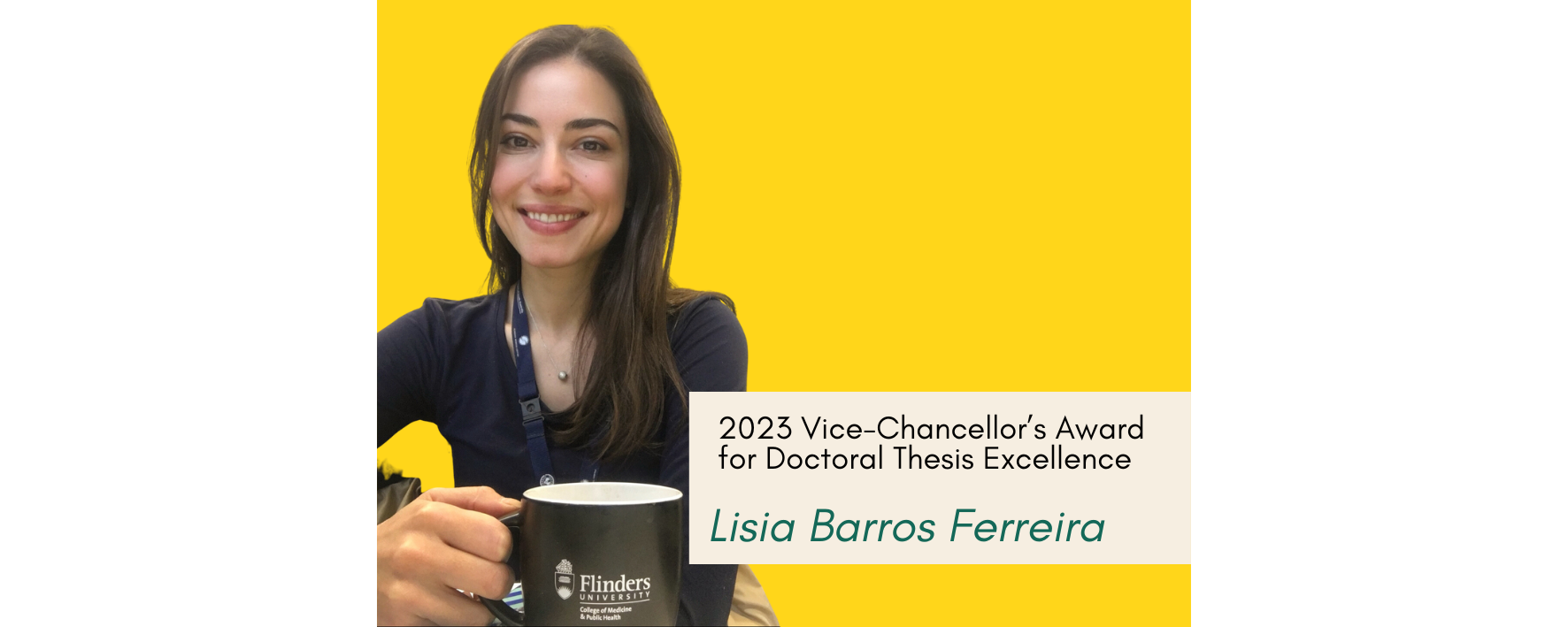
Lisia Barros Ferreira is from the College of Medicine and Public Health and is one of the 12 winners of the Vice-Chancellor’s Award for Doctoral Thesis Excellence for 2023. Lisia was supervised by Professor Justine Smith, Emeritus Professor Keryn Williams and Dr Giles Best from Flinders University.
Lisia’s thesis Effects of Inflammatory Cytokines on Human Retinal Endothelial Cells studied the effects of inflammatory cytokines on human retinal endothelial cells, identifying the chief cytokines involved with retinal endothelial cell dysfunction and the driving mechanisms of it.
We invited Lisia to share insights into the PhD journey and what winning this award means.
What does winning this award mean?
It is an honour to have the work of my thesis recognised by this award. It is certainly encouraging to keep working diligently in my future endeavours.
Tell us about yourself
I am an ophthalmologist back in Brazil. I did my medical, residency and uveitis fellowship training in Brazil. Later, I went to Canada to specialise in medical retina at the University of Toronto before coming to Australia for my PhD, which was originally a Masters of Science by research and was converted to PhD. Besides my passion for science, I am an enthusiast of nature and tennis.
What led you to undertake a PhD? What inspired or motivated you?
Since the beginning of medical school, I knew I wanted to do a PhD, as that would complement my education. I was interested in translation research, and I knew Professor Justine Smith was renowned for her work as a clinician-scientist in the field of uveitis. I was motivated by her work.
![]()
What was your research about and why was it important?
My research focused on identifying the main cytokines involved in human retinal endothelial cell dysfunction in intraocular inflammation and understanding the associated underlying mechanisms, additionally investigating long noncoding RNAs involved in retinal endothelial inflammation. The research was in the realm of intraocular inflammation – also called uveitis -, which is the field of ophthalmology I have specialized. Having done basic research complemented the clinical knowledge and changed my perspective of understanding uveitis.
What has been the most enjoyable and hardest parts of the PhD journey?
I really enjoyed working in the laboratory and learning different research techniques. I was also very fortunate to have amazing colleagues and supervisors. Although I enjoyed, the hardest part was having to learn how to work in the lab at the beginning, since I came from a clinical background.
![]()
How did you overcome any challenges of doing a PhD?
The pandemic was the trickiest time during the candidature when I knew I could not go back to my home country for any reason and then return to Australia to finish my work. Fortunately, I could finish all my laboratory work and then came back to Brazil to write up the thesis. For all the other challenges I have dealt with, I had the support of my supervisors.
What advice would you give to those who are about to undertake a PhD?
It is worth it! It can be challenging sometimes but in the end you will learn so much and feel proud about all the challenges you overcame.
![]()
Have you published anything?
Directly arising from the work from the PhD, I have published 2 papers and have currently another one under review. Additionally, I have published 2 reviews and one original article during the PhD candidature, besides having collaborated in another 3 publications.
Publications arising directly from the thesis:
- Barros Ferreira L, Ashander LM, Appukuttan B, Ma Y, Williams KA, Smith JR. Expression of long non-coding RNAs in activated human retinal vascular endothelial cells. Ocul Immunol Inflamm. 2022;1-6. https://www.tandfonline.com/doi/abs/10.1080/09273948.2022.2122512?journalCode=ioii20
- Ferreira LB, Ashander LM, Appukuttan B, Ma Y, Williams KA, Best G, Smith JR. Human retinal endothelial cells express functional interleukin-6 receptor. J Ophthalmic Inflamm Infect. 2023;13(1):21 https://joii-journal.springeropen.com/articles/10.1186/s12348-023-00341-6
- Ferreira LB, Ashander LM, Ma Y, Appukuttan B, Best G, Williams KA, Smith JR. Effects of tumour necrosis factor-α and interleukin-1β on human retinal endothelial cells. Cytokine. Under review.
Additional publications related to the thesis
- Ferreira LB, Smith AJ, Smith JR. Biologic drugs for the treatment of noninfectious uveitis. Asia Pac J Ophthalm (Phila). 2021;10(1):63-73. https://journals.lww.com/apjoo/fulltext/2021/02000/biologic_drugs_for_the_treatment_of_noninfectious.10.aspx
- Ferreira LB, Farrall AL, Furtado JM, Smith JR. Treatment of noninfectious uveitis. Arq Bras Oftalmol. 2021;84(6):610-621. https://pubmed.ncbi.nlm.nih.gov/34431877/
- Ferreira LB, Williams KA, Best G, Smith JR. Inflammatory cytokines as mediators of retinal endothelial barrier dysfunction in non-infectious uveitis. Clin. Transl. Immunol. Under review.
Additional publications during the PhD candidature
- Ashander LM, Lumsden AL, Dawson AC, et al. Infection of human retinal pigment epithelial cells with dengue virus strains isolated during outbreaks in Singapore. Microorganisms. 2022;10(2):310. https://www.mdpi.com/2076-2607/10/2/310
- Oliver GF, Ferreira LB, Vieira BR, et al. Posterior segment findings by spectral-domain optical coherence tomography and clinical associations in active toxoplasmic retinochoroiditis. Sci Rep. 2022;12(1):1156. https://www.nature.com/articles/s41598-022-05070-9
- Ferreira LB, Furtado JM, Charng J, et al. Prevalence of toxoplasmic retinochoroiditis in an Australian adult population: a community-based study. Ophthalmol Retina. 2022;6(10):963-968. https://www.sciencedirect.com/science/article/pii/S2468653022002159?via%3Dihub
- Haydinger CD, Ferreira LB, Williams KA, Smith JR. Mechanisms of macular edema. Front Med. 2023;10:1128811. https://www.frontiersin.org/articles/10.3389/fmed.2023.1128811/full
![]()

